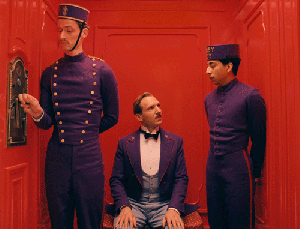The Grand Budapest Hotel: A Review
by theprickliestpear
Like many of Wes Anderson’s films, The Grand Budapest Hotel is an enchanting sight. Anderson, as always, pays meticulous attention to detail and has a particular eye for color. Brilliantly charming and teeming with vivacity, the film focuses on the blossoming relationship between a renowned concierge named Monsieur Gustave H. (Ralph Fiennes) and his lobby boy Zero Moustafa (Tony Revolori). The film is intricately set in four time periods. The first is not made known, but shows a young woman carrying the book The Grand Budapest Hotel as she visits a memorial site donning several hotel keys. Then it is 1985, where we meet the Author (Tom Wilkinson) who remains nameless throughout the film. He speaks to the audience directly and begins to tell us of how he came to write this book. In 1968, the Author (Jude Law) visits The Grand Budapest Hotel where he meets Zero Moustafa (F. Murray Abraham), owner of the once famous Grand Budapest Hotel. He tells the Author the story of how he came to own the hotel, transporting viewers to the year 1932.
The charismatic Monsieur Gustave H. is revealed to attend to elderly blonde and rich women who visit the hotel in ways beyond the duties of a concierge. When he learns that Madame D. (Tilda Swinton) has passed away, he rushes to her, bringing his newly employed lobby boy, Zero, along. Monsieur Gustave defends Zero on the train ride there when the military police try to hassle him for insufficient documentation. Their relationship proves to be more than that of employer and employee, rather caring mentor and admiring mentee. Anderson seems to be repeating a pattern (considering that Zero happens to be an orphan) seen in many of his previous films including Rushmore, The Life Aquatic with Steven Zissou, and Moonrise Kingdom. When confronted about the repetition of this situation by critics, he revealed, “it’s just the opposite of what I really grew up with, and for me there’s something exotic about it…I’m drawn to those father-figure characters that are larger-than-life people, and I’ve sought out mentors who are like that, so I relate to them” (biography.com). “Larger than life” are precisely the words to accurately describe Monsieur Gustave, a man of impeccable taste, holder of high standards for his hotel, yet partaker in the most scandalous of exploits.
Monsieur Gustave is left with Madame D’s most prized painting, “Boy with Apple,” and is consequently accused of murdering her by her other heirs. The remainder of the film consists of Monsieur Gustave working to prove his innocence, with help from the loyal Zero, while avoiding the malevolent antics of Madame D’s son and his henchman and fleeing the military police. Mr. Moustafa, when speaking of his mentor years later, expressed to the Author that “[he thought Monsieur Gustave’s] world had vanished long before he ever entered it – but…he certainly sustained the illusion with a marvelous grace.” He fondly remembered his most trusted guide as he related, “there [were] still faint glimmers of civilization left in [the] barbaric slaughterhouse that was once known as humanity… He was one of them.” In a time ridden with war and totalitarian brutes, Monsieur Gustave stood out in stark contrast. For instance, take the dull gray that adorns the uniforms of the military as opposed to the undiluted purple that embellishes Gustave’s.
This film is not for those with diminutive attention spans. Anderson, as always, exhibits fast paced wit and dialogue. The elaborate story telling and hurdles in time demand attentiveness. If you’re capable of such, this film is beyond worthy of one hundred minutes of your time.



Your summary’s clear and well written. I watched this movie a month ago and I was able to recall each of the scenes you described clearly. I also agree with you, that this movie, along with his other films, demands your attention. I remember walking out of the theater feeling like I missed a lot of the dialogue because of the quick pace that’s set in the film, as in his other films. I know I’ll have to watch it again though. I like Wes Anderson’s films. I’ve seen The Fantastic Mr. Fox, The Life Aquatic, The Darjeeling Limited, The Royal Tenenbaums, and Moonrise Kingdom. I liked that you did some research and found the common “father-figure” theme that can be seen in each of his films. I’ll definitely have to watch this movie again to catch what I missed.
I also though this was an excellent film. Speaking as someone who is not necessarily a Wes Anderson fan (I’ve only seen Fantastic Mr. Fox and a bit of Rushmore), I was really surprised and impressed by the off-beat and quick-paced humor of the film.
I really, really enjoyed the beautiful color in this film, and the way it was shot. Every frame highlights Anderson’s eye for symmetry and precision, yet they never feel stuffed or too technical. (After a while, however, I WAS starting to count the number of side to side tracking shots he uses. It was a lot.)
Good review!